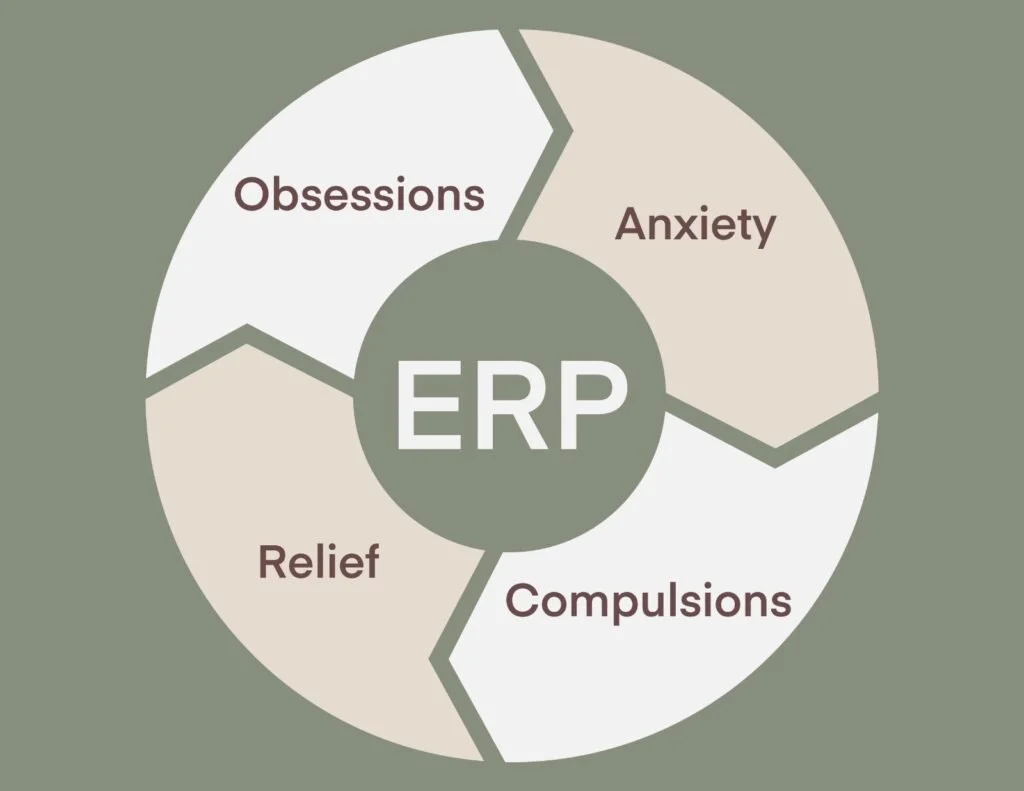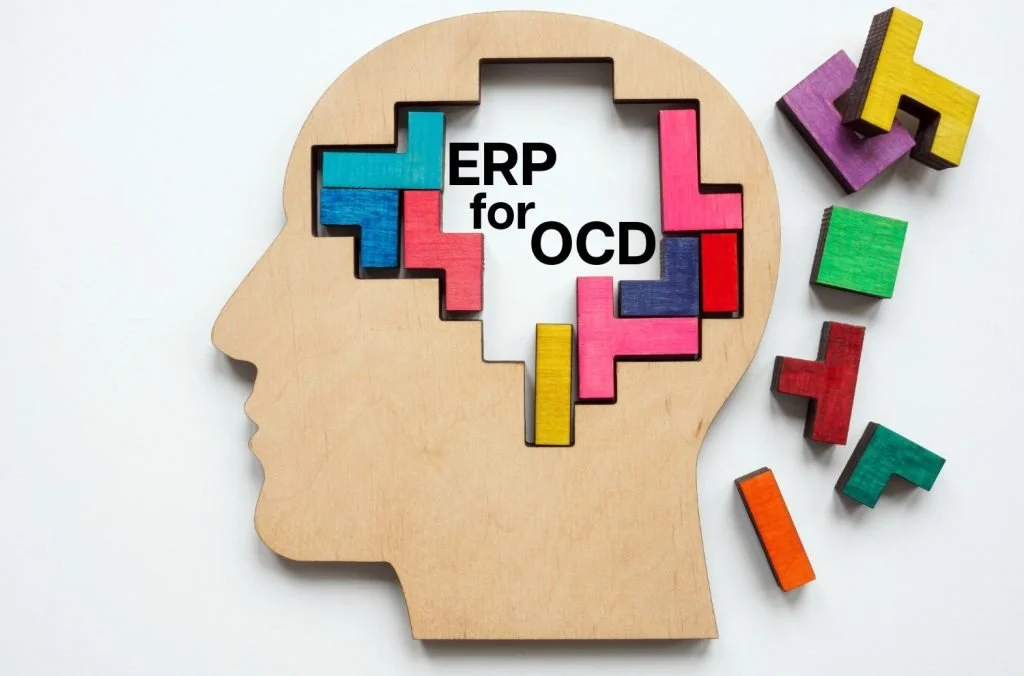Why ERP is Hope for OCD
By: Hailey George (Conston)
Living with Obsessive-Compulsive Disorder (OCD) can feel like being trapped in a room with a bully who never stops talking. The constant intrusive, unwanted, or repetitive thoughts (obsessions) and the draining compulsions can steal your peace and joy. Compulsions can look different than portrayed in the media or online and include avoidance behaviors, rituals, checking, reassurance seeking, confessing, and rumination, some of which are mental compulsions that others cannot see. You might have tried to fight back, only to feel more exhausted. But what if the path to freedom isn’t about fighting harder, but about learning to face the fear differently? This is the core of Exposure and Response Prevention (ERP) therapy, a powerful tool that offers real hope.
ERP is considered the gold standard for treating OCD. That’s a bold claim, but it’s backed by decades of research and countless stories of recovery. It’s a specific type of therapy that’s designed to break the cycle of obsessions and compulsions. The idea can sound intimidating at first, but with a compassionate therapist trained in ERP, it is a journey toward lasting freedom, rooted in the courage God provides.
What Is Exposure and Response Prevention (ERP)?
Let's break down the name.
Exposure: This means you will gradually and intentionally face the thoughts, images, objects, and situations that trigger your obsessive fears. These are the things you’ve been working so hard to avoid. The key word here is gradually. You will work with a trained therapist to create an exposure hierarchy, starting with things that cause only mild anxiety and slowly building up from there. The idea is to build confidence in the process, and allow your brain to learn that these perceived threats are not always real threats.
Response Prevention: This is where you learn to resist performing the compulsive behaviors or rituals you usually do to reduce your anxiety. By not "giving in" to the compulsion, you teach your brain a new and vital lesson: the anxiety will pass on its own, and the feared outcome will not happen. Response prevention is the #1 way to work through the anxiety that comes from OCD. If we just use exposures while compulsions are happening, anxiety could increase. That is why it’s important to do this with a therapist trained in ERP and also to start by preventing these responses/compulsions.
Think of it like learning to swim. You wouldn't start by jumping into the deep end. You’d begin by dipping your toes in, then wading in shallow water, all with an instructor by your side. ERP works the same way. Your therapist is your trusted instructor, guiding you as you learn to navigate the waters of anxiety without relying on the temporary relief of compulsions.
How Does ERP Break the OCD Cycle?
OCD thrives on a deceptive loop. An obsessive thought creates intense anxiety, and the compulsion offers a brief moment of relief. This relief reinforces the idea that the compulsion is necessary for safety. Your brain learns: Obsession + Compulsion = Temporary Safety.
ERP directly challenges this faulty equation. Let’s look at an example.
Imagine Michael, who has an intense fear of contamination. His obsession is that touching a doorknob will expose him to deadly germs. His compulsion is to wash his hands for five minutes straight.
In ERP therapy, Michael and his counselor would create a "fear hierarchy." A low-level exposure might be looking at a picture of a doorknob. A step higher might be touching a doorknob in his own home with a glove on. Eventually, he would work his way up to touching a public doorknob without immediately washing his hands.
During the "Response Prevention" part, Michael would sit with the anxiety that comes from touching the doorknob. This is the hardest, yet most crucial, part. His brain is screaming at him to wash his hands to be safe. But by resisting that urge, he learns a powerful truth: the anxiety, though intense at first, eventually fades. He also learns that his feared outcome—getting sick from the doorknob—may or may not happen. (Previously, his brain would have been convinced that this outcome would always happen.)
This process is called habituation. Your brain gets used to the trigger and stops sending such loud alarm signals. Over time, doorknobs become just doorknobs again, not terrifying threats.
Why Does Facing Fear Work?
Avoiding our fears makes them grow stronger. Every time you perform a compulsion, you are telling your brain, "See? That was dangerous, and my ritual saved me." ERP does the opposite. It proves to your brain that you can handle the distress and that the perceived threat is not as powerful as it seems.
This aligns with a profound spiritual truth. God calls us to live in faith, not fear. While ERP is a clinical tool, the courage it requires is something we can ask for in prayer. Scripture reminds us, "For God has not given us a spirit of fear, but of power and of love and of a sound mind" (2 Timothy 1:7). ERP helps you build that "sound mind" by confronting the lies of OCD with reality.
A trained Christian counselor can integrate these truths into your therapy. They can pray with you, help you find strength in scripture during difficult exposures, and remind you that your identity is in Christ, not in your diagnosis.
Examples of ERP in Action:
For Fear of Harming Others: Someone who fears they might hit someone while driving might practice driving on a quiet street and resisting the urge to circle back and check.
For Scrupulosity (Religious OCD): A person who obsessively prays for forgiveness might practice sitting with an "impure" thought without immediately launching into prayer, learning that the thought itself does not make them a bad person.
For "Just Right" Sensations: An individual who needs things perfectly aligned might practice leaving a book crooked on a shelf and tolerating the uncomfortable feeling until it subsides.
Your Path to Healing Starts Here
The journey of ERP is challenging, but the freedom on the other side is worth it. It’s not just about managing symptoms; it’s about reclaiming your life from the grip of fear. It’s about being able to hug your loved ones, pursue your passions, and live with peace and purpose.
You don't have to face this bully alone. At Christian Counseling of Tampa, we have a counselor who is trained in the evidence-based method ERP and is dedicated to supporting you with compassion and faith. We will walk alongside you, step by step, as you move toward healing.
If you are ready to stop letting OCD call the shots, we are here to help. Take a courageous first step by completing the contact form on our website to connect with one of our counselors today.



